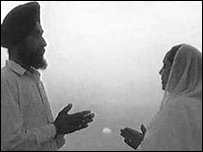
During the first year of university, fresher's week had passed and Sunday had arrived. I was looking forward to going to the Gurdwara. My brother had told me that there was a Gurdwara in Sheperd's Bush. I was excited to go to the Gurdwara because during Fresher's Week I didn't have the opportunity to meet Gurmukhs and do Sangat.
I arrived at the Gurdwara at 10.15am. I thought I was 'not too early' or 'too late'. However, I had MISSED the whole Gurdwara programme. On Sundays Shepards Bush Gurdwara has Aasa Di Vaar keertan followed by Langar EARLY MORNING from 6am to 8.30am. Then Sunday evening evening there is a programme from 6.30pm to 9.30pm. On Wednesday evenings there is another Diwaan held. However, I didn't know this, so I missed the whole programme. At 10.15am there was NO ONE at the Gurdwara, other than the Giani Jee.
I did Matha Tekh and Giani Jee gave me Karhah Parshaad. He then asked who I was and where I came from. I explained I was new to London and started university a week ago. Giani Jee was very friendly and said something very meaningful. He said: "Son! Don't think your university studies are difficult. The TRUE EDUCATION is the living the life of a Gursikh and NAAM JAPNAA (meditating on Waheguru's Name). Compared to degrees and PhD's, the path of the Guru and Naam is the most difficult thing to study, but it is also THE MOST REWARDING. Remember this!"
Giani Jee quoted Gurbani:
ਆਖਾ ਜੀਵਾ ਵਿਸਰੈ ਮਰਿ ਜਾਉ ॥
aakhaa jeevaa, visrai mar jaa-o.
Chanting it, I live; forgetting it, I die.
ਆਖਣਿ ਅਉਖਾ ਸਾਚਾ ਨਾਉ ॥
aakhan aukhaa saachaa naa-o.
It is so difficult to chant the True Name.
(Ang 9)
Concentrating on Gurbaani & Naam is very difficult and not easy. We ourselves cannot achieve anything, its ALL Guru's Kirpa. Reading inspiring books of the jeevan and biographies of Great Gursikhs, doing Sangat of Gurmukhs, going to the Gurdwara and listening to Katha (discourse) on Gurbaani at the Gurdwara Daas has learnt some ways of improving concentrating when reading and meditating on Gurbaani, in particular Nitnem (daily routine prayers). Below are some things which Daas has learnt:
1. PREPARING THE MIND and bringing it in the RIGHT MOOD/state.

Tuning the mind to make it receptive to Gurbaani & Simran is important. Through personal experience some ways of doing this are:
- Singing MOOL MANTR or any SHABAD while in the shower.
- For 15 minutes or so closing eyes and doing Mool Mantr meditation - slowly and clearly saying each Word. One's focus should be on the SHABAD (the Divine Word). I usually try to visualise my ear's going infront of my head and then picking up the vibration and sound of Gurbaani. The same applies with Naam Simran (meditating on Gur-Mantr - "VAAHE-GUROO").
- Closing eyes and bringing the mind's ATTENTION to the breath. FEEL yourself breathe in and out. Then as well as that gradually draw your attention to your where your hands are placed, what your are feet are touching, then eventually also try to draw attention to what you can hear. Adding this up all together, it helps to achieve the mind to come into the PRESENT.
2. Reading out ALOUD so that one can HEAR what is being read.

Gurbaani says:
ਸੁਰਤਿ ਸਤਿ ਸਤਿ ਜਸੁ ਸੁਨਤਾ ॥Why are our ears and listening so important? Note that a child which cannot hear, whose hearing is impaired or who is not able to listen, that child cannot speak. A child who cannot hear cannot speak. This is a medical fact. A child may be born with a perfect mouth and tongue, yet if he or she cannot hear then they cannot speak.
surat sat, sat jas suntaa.
Those ears are True, and True are those who listen to Waheguru's Praises.
(Ang 285)
The ears are connected to the brain (mind) and mouth. For this reason Guru Nanak Sahib jee in Japjee Sahib first emphasises "SunNaa," (listening) then Guru Sahib talks about "ManNaa," (obeying and following).
3. Paying careful attention to the CORRECT PRONUNCIATION the Gurbaani.

Two weeks ago I was listening to Katha (discourse) by a Giani Jee at Park Avenue Gurdwara, Southall. The Giani Jee pointed out that people are always saying that "I cannot concentrate when reading Paath". He said that one way of focusing the mind, particularly for those who are not so familiar with the meanings and explanations of the Gurbaani being read, is to focus on the letters, sounds and pronunciation.
Giani Jee told a Saakhi (story) from Guru Gobind Singh's jee's time. A Paathi Singh (Sikh reading Gurbaani) was reading Gurbaani incorrectly and mispronounced a word due to the fact he was not paying careful attention to the grammar and sounds. Guru Sahib asked some Sikhs to go and make the point that one should correctly pronounce Gurbaani.
The Sikhs called over the Paathi Singh. One of the Sikhs was hot-tempered and slapped the Paathi Singh. The Paathi Singh came rushing to Guru Sahib and said, "Guru Sahib! You said that those who read Gurbaani will not face the wrath and punishment of the Messengers of Death, BUT I am facing punishment and slaps HERE for reading Gurbaani. Please explain."
Guru Sahib said that the he had not asked for anyone to slap him but rather make a point. Guru Sahib said that he just wished the Sikhs to make a point to him that one should be CAREFUL to pronounce Gurbaani correctly. A sound said wrong can change the meaning to mean something totally different. Guru jee said the Divine Words are his LIMBS (angs), a part of his body. When someone mis-reads Gurbaani then it is like twisting the limbs of Guru.
The Paathi Singh apologised and asked Guru Sahib to organise someone to teach the Sikhs 'shud' (correctly) pronounced Paath.
If the mind is focusing on the SOUNDS and LETTERS (lagaa maatraa) then the mind will less likely wonder. We are NOT perfect! However, we can make a step in the right direction of being AWARE of sounds, grammar and letters and taking benefit of learned Gursikhs and Giani Jee's to learn correct pronunciation of Gurbaani.
4. While reading, trying to focus the mind on the MEANINGS of what is being read.

A Gutka (prayer-book) with Gurmukhi plus English (or Panjabi) TRANSLATION is very useful. One can UNDERSTAND what is being said while reading Gurbaani. When you get to a stage that you sub-consciously know most of the Paath, then it becomes easy to recite the Gurbaani with your mouth and with your eyes read the English translation, so the mind is able to process both and ABSORB the MESSAGE.
ਹਉ ਵਾਰੀ ਜੀਉ ਵਾਰੀ ਪੜਿ ਬੁਝਿ ਮੰਨਿ ਵਸਾਵਣਿਆ ॥
hau vaaree jee-o, vaaree paR bujh man vasaavaNi-aa.
I am a sacrifice, my soul is a sacrifice, to those who read of the Lord Waheguru, who understand and enshrine Him within their minds.
ਗੁਰਮੁਖਿ ਪੜਹਿ ਹਰਿ ਨਾਮੁ ਸਲਾਹਹਿ ਦਰਿ ਸਚੈ ਸੋਭਾ ਪਾਵਣਿਆ ॥੧॥ ਰਹਾਉ ॥
gurmukh paRehi har naam salaahehi, dar sachai sobhaa paavni-aa. ||1|| rahaa-o.
The Gurmukhs read and praise the Lord Waheguru's Name; they are honored in the True Court. ||1||Pause||
(Ang 127)
bhul chuk maaf.

very nice tips
ReplyDeletemanvir singh, ive only started reading your blogs but they are awesome!
ReplyDeletealways inspirational and informative.
thankyou.
gurfateh :D
ReplyDeletepaaji very nicely put
Vaheguru Ji Ka Khalsa, Vaheguru Ji Ki Fateh.
ReplyDeleteDear Bhaaji, your thoughts and all the seva you do by poeting informative articles especially the quotes from Gurbani itself has helped and inspired me alot. Even though I am a Amritdhari Sikh I fell at times I know nothing and always enjoy and try my best to learnm of others experiences to learn more. You have depply inspired me.
May Vaheguru Ji shower you with even more blessings.
Thank you.
I like all the tips and will try to follow while reading gurbani
ReplyDelete